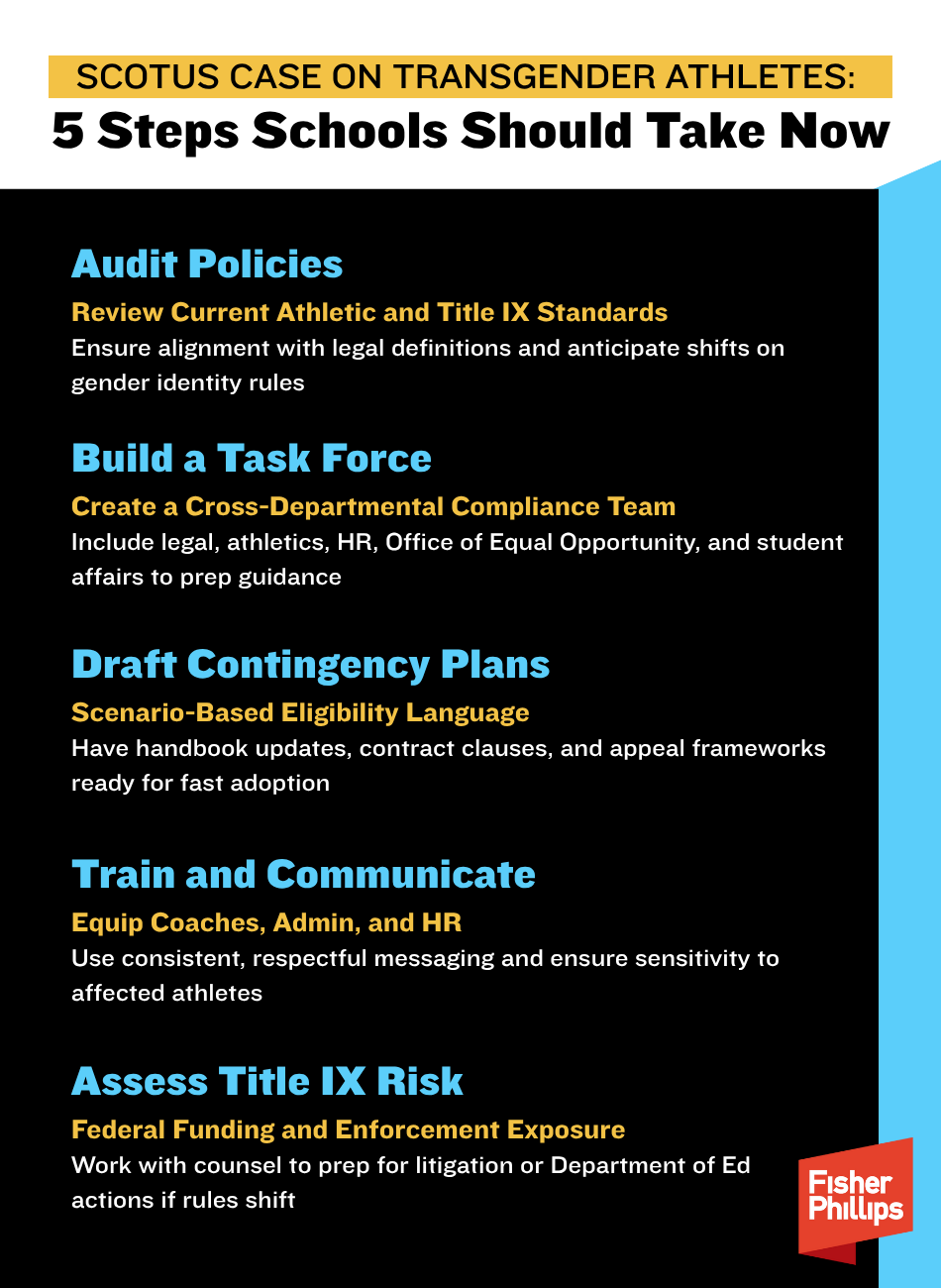The Supreme Court will soon decide whether states can ban transgender high school and college athletes from participating on female sports teams at their schools. After initially declining to review this issue in 2023 and essentially allowing a transgender girl to continue to compete, SCOTUS has reconsidered and will now hear the issue with a final decision expected in 2026. While the Court has yet to render a definitive opinion, its reconsideration of the issue is a signal that there may be significant changes to the high school and collegiate sports landscape in the near future. What does your school or athletic organization need to know about what’s at stake and the impact the decision may have on athletics nationwide?
The Path to the Supreme Court
Since the beginning of his second term, President Trump has demonstrated support for prohibiting transgender girls and women from women’s sports.
- In February 2025, the President implemented an Executive Order, “Keeping Men Out of Women’s Sports,” which defined “sex” as an individual’s biological sex at birth, interpreted Title IX to prohibit transgender women’s participation in girl’s and women’s sports, and directed federal agencies to prioritize Title IX enforcement actions against educational institutions that require female students to participate in sports against “males.”
- The NCAA followed suit and revised its policies to limit college competitions in women’s sports to athletes who were assigned female at birth.
- At the present time, 27 states have passed laws that restrict transgender athletes from competing in women’s sports.
Idaho and West Virginia are currently at the center of this nationwide debate, as both states enacted laws challenged by transgender athletes in these cases.
- In Idaho, the Fairness in Women’s Sports Act not only prohibits transgender athletes from participating, but also permits female athletes to contest the sex of a competitor.
- Meanwhile, West Virginia is seeking to enforce the Save Women’s Sports Act that restricts participation on girls’ teams to people classified as female at birth based on reproductive biology and genetics.
In both cases, the appellate courts ruled against the states, finding Idaho’s law violates the Constitution’s equal protection clause by targeting transgender people, and West Virginia’s law violates Title IX. On July 3, SCOTUS agreed to hear both cases to render a decision on this matter.
Recent Judicial Rulings
While SCOTUS will hear these appeals in the fall of 2025, previous rulings involving transgender rights from SCOTUS shed some light on where the Court may be headed in the fall.
- In June, the Court upheld a Tennessee law that bans gender-affirming care for minors, which prevents children from taking puberty blocking treatment.
- The Court has also upheld the President’s executive order to ban transgender individuals from serving in the military.
These decisions suggest the Court may rule in favor of Idaho and West Virginia.
Potential Impact
The pending appeals have sparked concerns about the potential for a significant shift in collegiate sports. Particularly, universities that receive federal funding would need to revise their athletics eligibility policies to comply with the Court’s interpretation of Title IX.
Additionally, recruiting practices, scholarship allocations, and facility usage, among other routine operations, would need to be altered to prevent any threat of reduced federal funding.
5 Steps for Schools and Universities to Prepare:
In anticipation of the expected ruling from SCOTUS, consider taking the following five proactive steps to put yourself in the best possible position:
1. Audit Existing Athletic Participation Policies – Conduct a comprehensive review of current athletics eligibility rules, Title IX compliance protocols, and how they address gender identity. Identify any policies that could conflict with anticipated legal developments, especially those concerning biological sex definitions and eligibility standards.
2. Establish a Compliance Task Force – Create a cross-functional working group –including representatives from athletics, legal, student affairs, Offices of Equal Opportunity, diversity professionals, and HR – to monitor legal developments, prepare for potential policy shifts, and develop guidance for staff, students, and teams.
3. Plan for Contingent Compliance Frameworks – Begin drafting flexible, scenario-based eligibility criteria and appeal procedures that can be quickly adopted if the Court rules in favor of state restrictions. Consider pre-approving language for athlete handbooks, scholarship agreements, and coaching contracts to address future legal mandates.
4. Invest in Training and Communication Tools – Develop proactive training modules for coaches, athletic directors, and HR professionals on the evolving legal landscape. Ensure messaging balances compliance with sensitivity toward affected student-athletes and institutional values.
5. Evaluate Risk and Exposure Related to Federal Funding – Coordinate with legal counsel to assess how changes to Title IX interpretation may impact federal grant eligibility or enforcement actions by the Department of Education. Prepare a risk management strategy to address potential litigation or regulatory scrutiny.
Conclusion
For further information, contact your Fisher Phillips attorney, the authors of this Insight, or any attorney on the firm’s Sports Industry Team or Higher Education Team. Fisher Phillips will continue to monitor developments impacting employers, so make sure that you are subscribed to Fisher Phillips’ Insight System to get the most up-to-date information direct to your inbox.
Law Clerk Julian Barreto contributed to authoring this Insight.








